The Unanticipated Effects: Feeling Sick After Meditation
You began your meditation journey expecting peace and tranquility. Yet, to your surprise, you find yourself feeling sick after meditation. This phenomenon may seem bewildering, even contradictory. Isn’t meditation supposed to be a pathway to better health, both mental and physical? Well, while meditation generally offers numerous health benefits—such as better sleep through mindful movement sleep and enhanced focus by clearing energy in meditation—it is possible to feel unwell afterward. Let’s delve into why this might be happening.
Sensation: A Double-Edged Sword
Meditation enhances your awareness of your own bodily sensations, including those that you might generally ignore or suppress. While being in tune with your body is generally positive, as discussed in our body’s awareness, increased sensitivity can sometimes make you notice discomforts you weren’t aware of before. It’s much like tuning a radio to catch a specific frequency; in the process, you become aware of both harmonious tunes and static noise. The ancient knowledge of frequency explains how vibrations around and within us affect our well-being.
Body Awareness: What Your Body is Trying to Tell You
Enhanced body awareness may make you more susceptible to noticing anomalies. Feelings of nausea or discomfort are signals, not necessarily problems in themselves. They might even be old sensations that are resurfacing. This is where energy transmutation comes in. Meditation acts as a catalyst, transforming latent emotional or physical energy into something tangible that you can deal with.
Relaxation Isn’t Always Comfortable
Surprisingly, relaxation can be another culprit. The state of deep rest that you enter during practices like floating meditation or u-relax moving can sometimes clash with your body’s accustomed state of stress. Our bodies can carry emotional weight on our shoulders—literal tension that we’ve grown so used to, we only notice it when it begins to dissolve. This process can sometimes feel strange, even disorienting.
The Healing Crisis: Release and Let Go
In some meditative practices like EMDR meditation or grief meditation script, you dig deep into your emotional or physical traumas for healing. You might think of it as a cleansing fire, burning away impurities. However, this ‘healing crisis’ often brings symptoms like nausea, headache, or emotional distress. According to experts, this phase is a natural by-product of releasing pent-up energy or suppressed memories.
“The path to healing sometimes leads us through the thicket of our inner complexities, rather than around them.”
Breathing and Meditation: The Air You Breathe
Finally, it’s crucial to talk about breathwork, an integral part of most meditation practices. You might be familiar with techniques that focus on mind breaths or even advanced practices that discuss DNA light codes. The way you breathe can influence how you feel after meditation. Incorrect breathing techniques could be responsible for your post-meditation sickness.
In summary, feeling sick after meditation isn’t necessarily a sign that you’re doing something wrong. It could be an indication that you are stirring up latent energies and sensations, preparing them for release or transformation. The awareness you gain through this process is an invaluable tool for personal growth.
Intrigued? Continue reading to explore strategies to counteract these sensations and enrich your meditation experience.
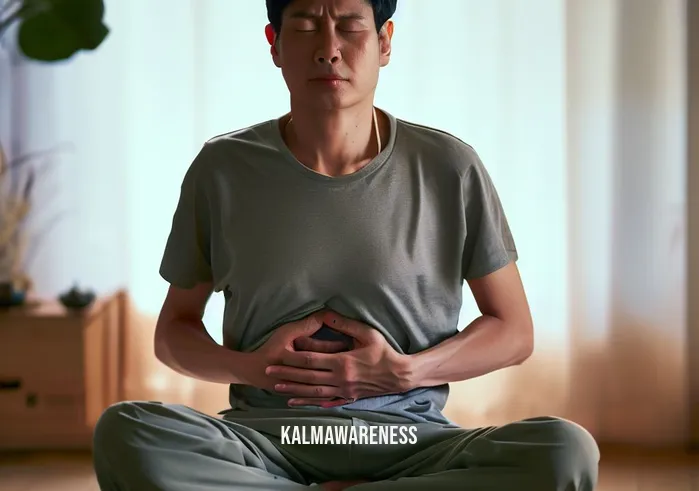
Strategies to Counteract Feeling Unwell Post-Meditation
We’ve unpacked the complexities behind feeling sick after meditation, a topic that can unsettle even the most seasoned practitioners. From heightened body awareness to emotional release, the landscape of post-meditation discomfort is as varied as it is intriguing. Now let’s shift our focus to strategies to address this puzzling phenomenon.
The Crucial Nature of Post-Meditation Discomfort
Why is it so essential to address the sensation of feeling sick after meditation? The short answer is, ignoring it could deter you from reaping meditation’s numerous benefits, such as promoting relaxation and awareness or facilitating flight rising meditation. Discomfort may serve as an indicator of underlying issues or as a sign that certain adjustments are needed in your practice.
Solutions for Physical Discomfort
Posture Adjustments: The way you sit or stand during meditation can contribute to discomfort. Using techniques like touching that specific body part can help in adjusting posture.
Mindful Snacking: Hunger can sometimes cause nausea. Maybe a small, healthy snack prior to meditating will make a difference.
Hydration: A common oversight is dehydration, which can cause headaches or dizziness.
Emotional and Mental Aids
Intention Setting: Before diving into practices like cutting cords prayer, setting a clear intention can prepare your emotional self.
Breath Awareness: Focusing on your breath, specifically techniques dealing with the mindfulness prescription for adult ADHD, can divert your attention from distressing emotions.
Expert Guidance: Sometimes, your body may react to the deeper psychological effects of techniques like c-section meditation. Professional guidance can help navigate these issues.
Post-Meditation Symptoms: A Quick Reference Table
| Symptom | Possible Cause | Recommended Action |
|---|---|---|
| Nausea | Hunger or anxiety | Eat a light snack or practice deep breathing |
| Headache | Dehydration or tension | Drink water or adjust posture |
| Dizziness | Rapid breathing | Slow down your breathwork |
| Emotional Surge | Unresolved emotional issues | Seek professional guidance |
| Fatigue | Over-relaxation | Engage in light activities like kid’s calm practices |
Safeguarding Your Practice
A well-rounded meditation practice should not just be effective but also safe. Here, “safe” means a practice that doesn’t lead to ongoing physical or emotional distress. Techniques like EMDR meditation and other trauma-focused practices should be done under expert supervision, especially if they make you feel sick after the session.
An Ongoing Journey
Meditation is a practice that can span a lifetime, offering new insights and challenges at every stage. The sensation of feeling sick after meditation is not just a hurdle but also an opportunity. It nudges you to fine-tune your approach, seek new methods, and deepen your understanding.
Are you interested in knowing more about enhancing your meditative journey while dealing with post-meditation discomfort? Continue reading as we take you through additional techniques and approaches that not only improve your experience but also guide you in understanding this fascinating subject more deeply.
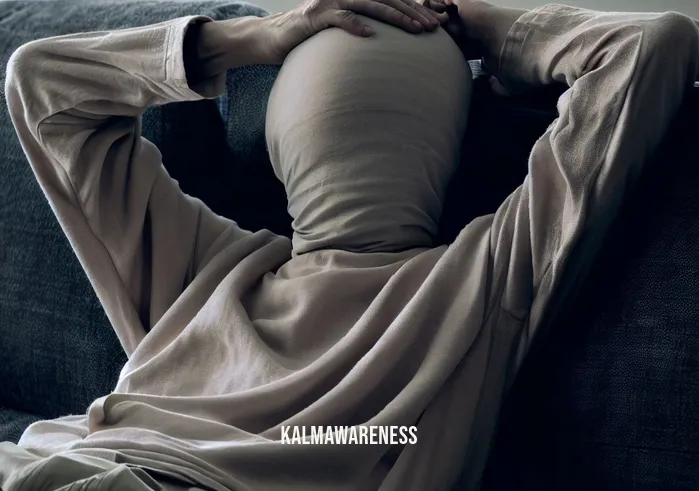
Uncovering Hope: Navigating the Unpleasant Sensations of Meditation
You’re not alone if you’ve ever felt uneasy, sick, or disoriented after a session of mindful contemplation. Even though feeling sick after meditation might deter you initially, it’s essential to remember that this phase, too, holds valuable lessons. Let’s explore how to unearth hope and inspiration from this seemingly challenging experience.
Relevance of Post-Meditation Discomfort
Understanding why you’re feeling unwell after meditating can open up a world of solutions and modifications. Such an experience could be likened to a ‘system reboot,’ stirring dormant emotions or physical sensations that need addressing. It’s about tuning in rather than tuning out, which is an underlying principle in meditating while high.
“The wound is the place where the Light enters you.” – Rumi
This quote encapsulates the transformative potential of facing discomfort. By acknowledging the symptoms, you also recognize the areas in your life that may need healing or reevaluation.
Inspiring Stories: Finding the Silver Lining
There are countless stories of individuals who, when they initially felt symptoms like nausea or headaches, chose to delve deeper into the practice rather than abandoning it. Through techniques like breathing exercises designed for children or even cutting cords prayer, they adapted and personalized their meditation journey.
“Out of difficulties grow miracles.” – Jean de La Bruyère
Techniques That Inspire Hope
In the realm of mindfulness, various practices are geared towards specific challenges. For instance, if emotional baggage seems to weigh you down during meditation, a clearing energy meditation can be a life-altering experience.
Another beneficial exercise is mindful movement sleep, which aims at soothing your body and mind. It allows you to focus on relaxing specific body parts, potentially pinpointing the origin of your discomfort.
“Do not anticipate trouble, or worry about what may never happen. Keep in the sunlight.” – Benjamin Franklin
The Unseen Advantages
While experiencing sickness or discomfort post-meditation may not seem like a blessing, it has its hidden advantages:
- Body Awareness: Learning to identify signals from your body can prevent future health problems.
- Emotional Clarity: Addressing emotional discomfort upfront can lead to profound emotional healing.
- Enhanced Techniques: The search for solutions could lead you to techniques you would not have discovered otherwise, such as u-relax moving or emotional weight exercises.
“When you replace ‘why is this happening to me’ with ‘what is this trying to tell me,’ everything shifts.” – Unknown
Continuing the Journey
Feeling ill or uncomfortable after meditating is like a signpost on your mindfulness journey, telling you to stop, assess, and perhaps take a different path. Understanding the ‘why’ behind this discomfort is the first step toward a more fulfilling, harmonious practice.
So, what’s next? Can you truly adapt your practice in a way that is both enlightening and comfortable? Continue reading as we delve into personalizing your meditation techniques to better suit your individual needs, thereby fostering a balanced and enriching experience.
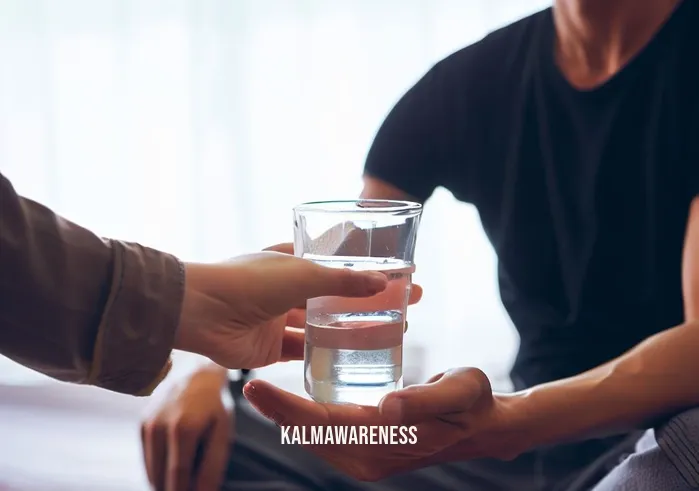
Decoding the Mystery: Why Do We Feel Sick After Meditating?
Feeling unwell after a meditation session can be perplexing and discouraging. As we’ve discovered in the previous chapters, this experience is not necessarily a red flag; it could be a signal for deeper exploration and adjustment. In this chapter, we’ll “break it down,” providing a structured analysis to further demystify why you may be feeling sick after meditation.
Unpacking the Symptoms
Experiencing discomfort post-meditation can manifest in various forms, be it physical, emotional, or psychological. To start, let’s categorize the symptoms and the meditation techniques that might influence them.
Physical Symptoms
- Nausea
- Headache
- Fatigue
Emotional Symptoms
- Anxiety
- Sadness
- Irritability
Psychological Symptoms
- Confusion
- Disorientation
- Overthinking
Various techniques such as EMDR meditation can specifically target emotional and psychological discomforts. Conversely, more physical ailments might be mitigated by focusing on mind-breaths or applying techniques from ancient frequency practices.
Common Triggers: What Activates These Symptoms?
Understanding the triggers can be equally enlightening. Triggers can be broken down into:
Environmental Factors
- Room temperature
- Seating arrangement
- Noise level
Personal Factors
- Pre-existing health conditions
- Recent meals
- Emotional state before meditation
Tips for Avoidance and Alleviation
Having identified the symptoms and triggers, let’s focus on some remedies.
For Physical Symptoms
- Posture Checks: Pay attention to your body alignment.
- Hydration: Ensure you’re well-hydrated before and after sessions.
- Guided Sessions: Utilize floating meditation techniques that guide you through the process, reducing chances of physical strain.
For Emotional Symptoms
- Grounding Techniques: Use simple exercises to bring your awareness back to the present.
- Mood Elevators: Incorporate DNA light codes meditation to target emotional balance.
- Companion Activities: Pair your meditation with uplifting activities like flight rising.
For Psychological Symptoms
- Reality Checks: Remind yourself that meditation is a safe space for exploration.
- Journaling: Document your thoughts and experiences.
- Therapeutic Techniques: Consider techniques like C-section meditation that have specific psychological applications.
Recalibration Through Mindfulness
Remember that mindfulness is your ally. The whole point of meditation is to develop a deeper connection with yourself, and sometimes, the road to self-awareness involves bumping into a few roadblocks.
“The road to enlightenment is long and difficult, and you should try not to forget snacks and magazines.” – Anne Lamott
What Awaits in the Final Chapter
We’ve discussed the symptoms, triggers, and remedies, and you may wonder, “What more is there to explore?” In our concluding chapter, we’ll explore how to knit these elements together into a cohesive, personalized meditation plan. You’ll learn to harmonize the practices, remedies, and mental adjustments needed to make your journey in mindfulness not only enlightening but also joyous and free from discomfort. So stay tuned!
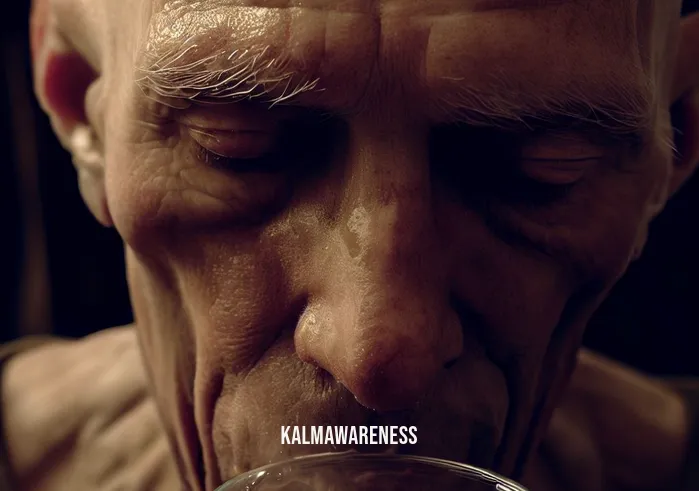
The Journey’s End: Revisiting Our Thoughts on Feeling Sick After Meditation
As we arrive at the end of our journey exploring the complex issue of feeling sick after meditation, it’s essential to reflect on the knowledge we’ve gained and consider the steps for moving forward. Just as a gardener doesn’t simply plant seeds and walk away, we should not consider our understanding of meditation to be complete without ongoing practice and refinement. Let’s recap the vital aspects and offer a fresh perspective for your continuing voyage into the world of mindfulness.
Tying Up Loose Ends
You’re not alone in experiencing discomfort or feeling unwell after meditating. We’ve explored the various symptoms, dissected potential triggers, and proposed actionable remedies. By incorporating holistic techniques like clearing energy meditation or engaging in mindful movement for sleep, you can begin to address the physical, emotional, and mental aspects that may be causing you to feel uneasy after your sessions.
The Light at the End of the Tunnel
“Even in our darkest moments, there’s a light somewhere. You just have to find it.” – Oprah Winfrey
This exploration has, hopefully, shed light on the potential reasons behind feeling unwell, nauseous, or even overwhelmed post-meditation. Take these lessons as signposts on your journey toward deeper self-awareness and healing. Remember, you can also address the emotional weight you may be carrying on your shoulders through specialized techniques like cutting cords prayer.
Embrace the Dynamic Nature of Mindfulness
Mindfulness is not static; it’s an evolving relationship with oneself. As you grow, your techniques and experiences with meditation will change. Kids can also benefit from mindfulness techniques; resources like Kid Calm can introduce them to this wonderful world, helping them navigate life’s challenges with resilience.
Your Next Steps: Call to Action
The adventure doesn’t have to stop here. Continue to explore other forms of meditation and mindfulness techniques available in our magazine. Whether you’re interested in energy transmutation, u relax moving techniques, or learning how to touch that body part mindfully, there’s always something new to discover.
“The real voyage of discovery consists not in seeking new landscapes, but in having new eyes.” – Marcel Proust
So, feel free to revisit previous chapters if you need more clarity, and keep an eye out for future editions filled with more enlightening content!
A Special Thanks to You!
Last but not least, we extend our heartfelt gratitude for taking the time to delve into this nuanced topic with us. The realm of mindfulness is as deep as it is wide, and we’re thrilled you’ve chosen to explore it alongside us.
“The only journey is the journey within.” – Rainer Maria Rilke
Stay tuned for more explorations and insights in our future editions. Here’s to a healthier, more mindful you! Cheers! 🥂
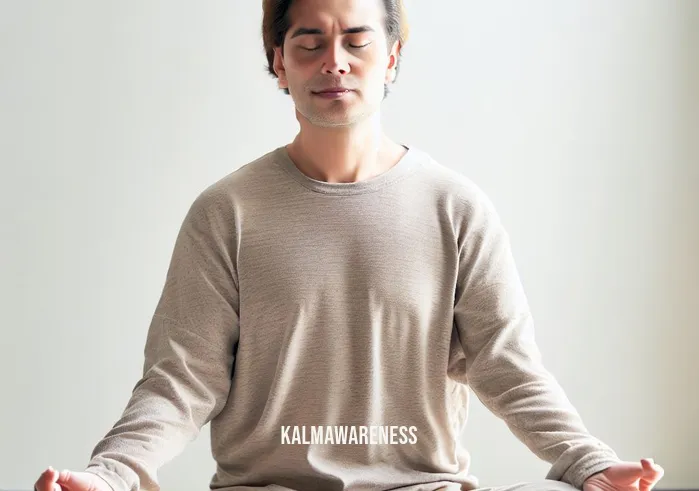

![vase breathing tutorial _ Image: [Scene: Vibrant flowers in full bloom, person smiling, room filled with light and fresh air.]Image description: The room is transformed. The vase now holds vibrant, fully bloomed flowers, radiating colors and life. The person, wearing a smile, enjoys the refreshing atmosphere. Sunlight floods the room, and the air feels light and invigorating.](https://kalmawareness.com/wp-content/uploads/2023/09/169_5.webp)

